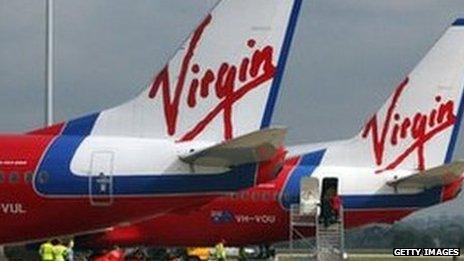Virgin Australia trebles its full year losses
- Published

Virgin Australia Holdings has posted an after-tax loss of A$355.6m ($332.6m; £200.5m) for the full year ending in June.
The result is more than triple the firm's previous year's loss of A$98.1m.
The carrier blamed weak consumer sentiment, overcapacity in the market and carbon tax costs for the loss.
Virgin also said on Friday that it would sell a 35% stake of its frequent flyer program to a private equity firm, valuing the program at A$960m.
The carrier, which is Australia's second largest behind Qantas, said ongoing uncertainty around the economy had also contributed to its full year loss and that it would not provide a forecast for the following financial year.
Virgin's underlying loss for the year of A$211.7m was in line with market expectations.
Difficult environment
"The 2014 financial year has seen one of the most difficult operating environments in the history of Australian aviation," said Chief Executive Officer John Borghetti.
Virgin competes head to head with Qantas in Australia, which reported a net loss of A$2.8bn for the same period on Thursday.
It was the national flag carrier's biggest ever annual loss.
Like Qantas, Virgin also blamed its full-year losses on restructuring and redundancy costs, together with write-downs on the value of its international fleet.
Virgin's sale of its Velocity frequent flyer program would be used to help lower the firm's debt, but is subject to regulatory approval from the country's foreign investment review board.
The partial sale of the program, which has some four and a half million members, would also be used to help improve Virgin's cash position, the firm said.
"The timing of the sale is perfect for us," Mr Borghetti said at a news conference on Friday.
Virgin Australia shares rose slightly in morning trade in Australia on the news.
Air New Zealand, Etihad Airways and Singapore Airlines own stakes in Virgin Australia, which in turn has a 60% stake in Tiger Airways Australia.